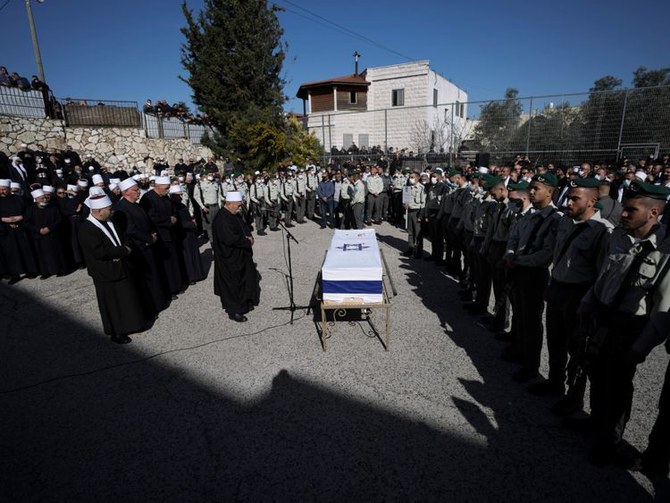Security fears were on Monday heightened in the wake of Sunday’s killing by Daesh gunmen of two Israeli policemen in the city of Hadera just hours ahead of a key meeting of foreign ministers.
The two assailants involved in the shooting were shot dead at the scene.
The incident followed stabbings last week in Beersheba that left four Israelis dead. Daesh has claimed responsibility for both terror attacks which have rocked security services working to ease tensions in Palestine.
On Monday, the foreign ministers of Egypt, the UAE, Bahrain, Morocco, Israel, and the US held a summit in Israel to discuss the Palestinian issue and other regional matters. The same day, Jordan’s King Abdullah visited the West Bank city of Ramallah.
Political leaders recently discussed the beefing-up of security measures in the West Bank and Gaza Strip in preparation for the month of Ramadan.
The Israeli government also agreed to increase from 10,000 to 20,000 the number of Palestinian workers from Gaza allowed to enter Israel, while easing import restrictions on certain goods.
Israeli army radio said that Israel’s government coordinator in the Palestinian territories, Ghassan Alyan, had recently travelled to Cairo for security talks with Egyptian officials, and Israel was also reportedly set to press ahead with pre-coronavirus pandemic plans to allow Palestinians in the West Bank to visit Jerusalem.
Events last year in Jerusalem and the city’s eastern Sheikh Jarrah neighborhood led to violence and contributed toward a fourth conflict between Gaza and Israel and security talks are aimed at avoiding a repeat of tensions this year.
Mostafa Ibrahim, a writer on Israeli affairs, told Arab News that Israel currently wanted to avoid any confrontations with the Palestinians. “It is clear that there is an Israeli desire, backed by American pressure, to calm the situation in the Middle East in light of the Russian-Ukrainian war,” he said.
The Hebrew newspaper, Yedioth Ahronoth, said that the Israeli security system faced a number of challenges in the run-up to the month of Ramadan, adding there were real fears in Israel of an escalation of violence in the Palestinian territories.
Ramadan coincides with the revival of Land Day on March 30, Palestinian Prisoners’ Day on April 17, the anniversary of the Great March of Return, and in May the first anniversary of last year’s Gaza conflict, and Nakba Day on May 15. All the events had the potential to spark confrontations.
And the newspaper claimed that Hamas was attempting to destabilize security and calm in the West Bank and Jerusalem, while maintaining them in the Gaza Strip.
“Hamas realizes that the escalation creates a security problem for Israel at the tactical level. At the strategic level, it threatens and undermines the legitimacy of the Palestinian Authority,” it reported.
However, despite underlying tensions, it did not predict any fresh flare ups in Gaza, Sheikh Jarrah, or at Al-Aqsa Mosque.
Ibrahim said recent international visits and dialogue would help contribute toward maintaining calm.
“The recent Israeli facilities — despite their limitations — and the various international pressures, the desire of Arab countries to focus on the global crisis following the war in Ukraine, and negotiations with Iran, have contributed to pushing the Palestinian areas to maintain calm,” he added.

